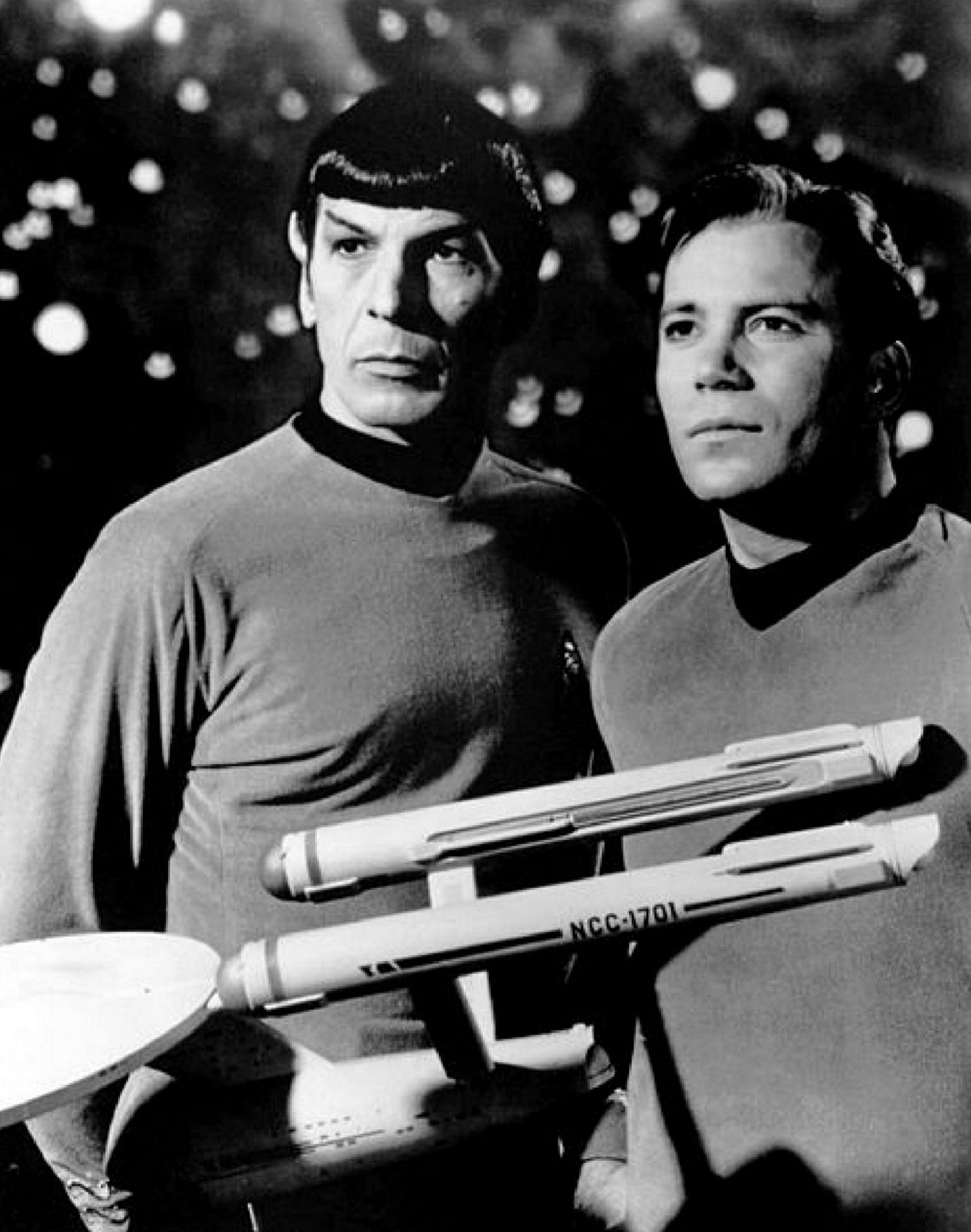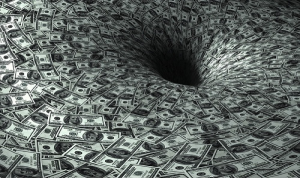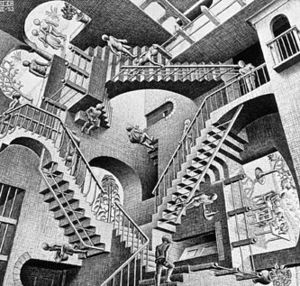Star Trek Snowflakes
Matt Novack at Gizmodo did a piece recently on William Shatner talking about Shatner's attacks on Social Justice Warriors. Shatner apparently has a distaste for them, calling them "snowflakes" and accusing them of misandry.
This has been distressing to die hard fans of the show, who apparently believe that Star Trek represents a vision that is holy and pure and utopian. Author (and Star Trek fan) Manu Saadia wrote a book about the "economics" of Star Trek, and he told Novack that
"It seems that Shatner has not so much misunderstood the source material than turned away from it",
and that
"Star Trek is the lone TV show that has carried the torch of equality, progress, and utopia in popular culture. To see one of its most famous ambassador using alt-right language should be a wake up call to fans."
The concept that Star Trek could somehow be a vision of the future and a torch that lights the way to that future got my mental wheels spinning, because this concept of science fiction as the prophet of the future seems to me to be part and parcel of all that is right but simultaneously all that is wrong with those who denigrate what we have because they believe it to be less than what could be.
Don't get me wrong. I love me some Star Trek. The idea of blurring out all of the frustratingly recalcitrant limitations of reality in order to focus in on human behavior is fun and fascinating at the same time, because it functions as a sort of laboratory where we can do imaginary controlled experiments with human nature, and it leads to some insights about human nature that we might never think about or realize when human nature is constrained by the ordinary limitations of reality.
But we have to be very careful in this process to remember that this imaginary construct is just that — IMAGINARY. The whole point of moving our evaluation of human nature to a non-real sphere is to allow us to put human nature under a microscope in a way that we cannot do in real life. To create a scenario that could never exist in real life so that we can think about human nature from perspectives that would otherwise never be visible because of the messy and complicated conflicting motivations that real life is full of.
Laboratory science with its controlled experiments does yield insights about the nature of whatever you are studying. But this artificial lab environment should never be confused with the way the real world works. At best it helps you understand a small part of the behavior of whatever you are studying in the real world. But then you always have to take that new knowledge and re-incorporate it back into the messy real world. That’s the step where value gets added. If your bench experiment doesn’t provide any predictive or explanatory power in the real world, then it was useless. A giant waste of time.
Now imagine if a bench scientist decided that the reason why his experiment wasn’t working in real life was that real life was flawed, and decided that real life needed to approximate the lab environment so that his experiment could be allowed to function in real life. That’s turning the whole process and the point of the whole process inside out and backwards. That’s getting so myopically focused on what you are doing that you don’t realize you are intently studying your own backside.
The whole point of imaginary constructs is that we can never do them in reality. And Star Trek fans and Social Justice Warriors both seem to have completely missed this point. They are so fascinated with the imaginary world they have created that it never occurs to them WHY it is imaginary. The entire concept of a "Star Trek economy" or a "Star Trek society" is a joke that they don't get because they have gotten themselves so corkscrewed down into that world that they have lost touch with how reality functions.
Star Trek Economics
A Star Trek economy is an economy that is supposedly post capitalism, post money and post scarcity — and it is imagined that once those 3 things have been accomplished, then human nature will be freed from its chains, free to soar to previously unimagined heights of social justice and universal equality. So let's think about those 3 things for a bit.
What exactly is a "post capitalism" economy? Capitalism simply means that the pieces of society that are productive are allowed to remain free, allowed to circulate freely throughout society and be owned and operated by whoever makes the most efficient use of those resources as judged by other members of society, who continuously vote on performance with their wallets. As opposed to them being appropriated and manipulated for political reasons by some authoritative body. So a "Post Capitalism" society would be a "Post Economic Freedom" society. How is that supposed to be a good thing?
In the minds of Trekkies and Social Justice Warriors, "Capitalism" equals "Greed", and from a childish point of view I can see how one might think that abolishing Capitalism would be equivalent to abolishing greed, but that simply betrays a sincere but unsophisticated appreciation for the true nature of human nature, and this unsophistication becomes toxic when combined with the overweening altruism that is the hallmark of utopians.
This same overweening altruism is behind the Drug War that has killed countless poor Mexicans and Central Americans and made America the prison capital of the world, the War on Terror that tries to conflate blowing up wedding parties full of brown people with some mythic vision of fighting for Freedom, and the War on Poverty that single handedly destroyed the inner city nuclear family. Yet despite innumerable real world examples of the perniciousness of arrogant altruism, those who seek to improve humanity by force cannot seem to fathom that you will not save the natives by making them wear pants.
Take the supposed "post money" economy so yearned for by those who think that the elimination of money would abolish inequality, would soothe our desire for more and make us all love each other. As if money is the talisman that channels evil and opens a doorway for it to enter into the world.
The elimination of money wouldn't eliminate greed at all. Greed is the problem -- not money. Those who seek to eliminate money don't understand money. They have no conception of its function as an energy translator, no clue as to how it coordinates the flow of energy through an economy to minimize waste and improve efficiency, and no functional awareness of the folly of arguing with the indicator we call price. Comfortable in their smug superiority they rail away at money as the root of all evil. And meanwhile, Venezuela beckons as a real world example of the devastation visited on innocent people by simpletons who believe themselves to be economic and social geniuses.
And so we arrive at the final idea of a "post scarcity" Star Trek world. Superficial thinkers don't understand that scarcity is what we call a "relative" word, indicating degree in relation to something else rather than an absolute on its own. There will never be an end to scarcity. To the aborigine of 10,000 years ago, scarcity was marked by drought and starvation and death. To the urban trust fund adultling, scarcity is marked by 3 friends fighting over 2 Burberry purses.
Human nature will never stop wanting more. Thus imagining a world built around the premise that we all finally have so much that we stop wanting more is equivalent to designing a giant, beautiful cathedral whose design process stopped 6 feet above the ground. The most important part of a building is its foundation. But if you try to explain the importance of foundations, the fundamental necessity of being tied strongly to the reality of the earth to someone with no practical awareness of geology or structural engineering or materials science, they will just hiss at you and call you a cathedral hater. Because they know better. Their cathedral is beautiful and deserving of being built, and the only thing standing between them and their utopia are people whose hatred of beautiful things prevents all of us from flying along with that cathedral.
The confrontation between the dreamers and the realists is not new. The dreamers always tell the realists that they are haters who just don't care, and the realists always tell the dreamers that they are ignoramuses who just don't understand. The reality is that both need each other, the dreamers are the sail and the realists are the keel and rudder. And society would be better served if they would communicate better.
But it is not helpful for the realists to cede the moral high ground to the dreamers. Too often this is the pattern. Realists present counter arguments, but then instead of talking about the counter arguments, dreamers follow the Alinsky playbook of freezing and personalizing the argument, and realists end up defending themselves against accusations of hatred instead of talking about practical differences. Allowing dreamers to claim the moral high ground is like accepting the conclusion that Escher was an amazing architect, and that the only reason we can’t build this building is because we are architect haters.
.jpg)
.jpg)





